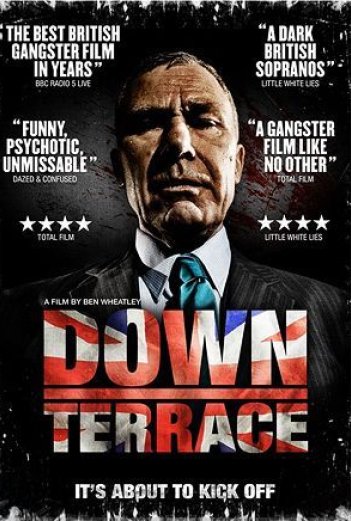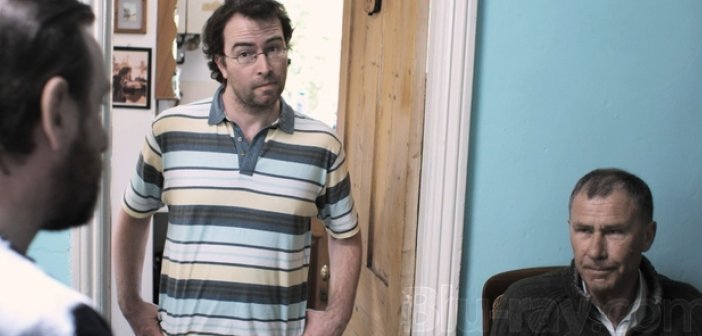The Start of Something Solid | Analysing Ben Wheatley’s First Film Down Terrace
High Rise, the fifth film by British director Ben Wheatley, was released this month on DVD. Like much of the auteur’s work, it is a strange, intoxicating cocktail of black comedy and violent horror. In celebration of the filmmaker, this article will re-examine Wheatley’s first effort Down Terrace – a gangster drama made in eight days with $30,000.
Set almost entirely in a family home, Down Terrace tells the tale of a father, Bill, and his son, Karl, (played by real life father and son Robert and Robin Hill) who operate a criminal organisation in Brighton for bosses in London. Karl has just been acquitted of a crime for a mysterious reason, while Bill is determined that there is a rat amongst them. On top of this, Karl’s ex-girlfriend, Valda (Kerry Peacock) shows up pregnant on his family’s doorstep. Valda’s arrival leads to conflict between the family, with Bill and his wife, Maggie (Julia Deakin – Spaced), believing the child is not Karl’s.

It’s a startling debut film for a number of reasons. Released in 2009, it came out at a time where the typical flashy British gangster film, popularised by the work of Matthew Vaughn (Layer Cake) and Guy Ritchie (Snatch, RocknRolla), was becoming tired and formulaic due to rethreads by less talented people (i.e any Danny Dyer/Tamer Hassan joint). Down Terrace revitalised the genre, doing something similar to a drama like The Sopranos in the sense that it explored its criminal characters in ordinary settings rather than solely lavish yachts or nightclubs surrounded by cocaine and prostitutes.
The film is comparable to the kitchen sink dramas of Mike Leigh or Ken Loach. Bill is not the king of his criminal organisation. He is just a pawn for someone bigger. As a result, his lifestyle is not glamorous. He has enough money to pay for his home and certain luxuries but he is far from being super-rich. Also, he and his wife’s cold and cruel nature, which gets highlighted as Down Terrace moves into its second half, has left them with few friends and allies. The only characters they interact with on a social level are Garvey (Tony Way), the son of Bill’s late best friend (who it’s heavily implied Bill killed) and Eric (David Schaal – Jay’s father in The Inbetweeners), Maggie’s brother who works with Bill.
Watching the film with the hindsight of Wheatley’s later works – Kill List, Sightseers and A Field in England – it’s amazing how fully-formed Wheatley’s authorial voice was straight out of the gate. Within Down Terrace, one can see the director’s ability to blend and mix genres seamlessly. As the central crime-family disintegrate and their actions become more and more unstable, the film evolves into an almost horror. This blend of kitchen-sink realism, gangsterism and terror is comparable to the tonal shifts in his later work, particular Kill List and Sightseers – with their mix of realism and genre hyper-violence.
Also, like High-Rise, the film is hilarious. The script by Robin Hill and Wheatley is at times razor-sharp. For instance, when Bill bemoans his son’s predicament with Valda: “Grandfather to a bastard. Is there a word for that?”. Maggie replies “c**t”.

Prior to shooting Down Terrace, Wheatley directed episodes of various sitcoms. This shines through in the movie in terms of how jokes are set-up and then later paid-off. Early on in the film, Karl gloats that Valda is coming to see him. Eric jokes that the reason she is visiting is because she is pregnant, to which Karl responds with riotous laughter. Ten minutes later, Valda appears at the door heavily pregnant and all Karl can do is point at her protruding stomach and shout “fuck!”.
The characters are humorous too. Wheatley regular Michael Smiley (the villain of the acid-trip that is A Field in England) plays Pringle, a character Robin Hill describes in the movie’s audio commentary as “a show-gun assassin”. A former soldier in the war, the unhinged Pringle volunteers his services to Bill while also bringing along his three-year old son, who he is incredibly protective of – not letting Karl be alone in the same room with him. Later when Bill takes up his offer, hiring him to interrogate Garvey in order to discover whether or not he is the rat, Pringle brings his son again because he couldn’t find a sitter. In arguably the funniest scene in the film, Garvey panics – locking himself in Bill’s upstairs bathroom while Pringle waits outside with his son, eventually going home out of boredom.
[youtube id=”x6gaBc-O_4A” align=”center” autoplay=”no” maxwidth=”750"]
Occasionally, the film’s low-budget roots show. There is an over-reliance on actors playing music and singing. I feel that this was Wheatley and Hill’s method of helping the audience empathise with their characters. However, it doesn’t entirely work and it slows the pace of the movie. There are also noticeable continuity errors. Karl, while looking at a photo album, moans that there are no pictures of him. However, there is clearly a photo of him in view of the audience – hinting that the scene was improvised on the spot.
These problems are forgivable though because the movie clearly has a brain in its head. It’s an exploration of toxic masculinity – as evident by Bill and Karl’s destructive relationship (and to a lesser extent Pringle and his son’s – who the hitman gloats attacked another child with a xylophone). It also draws a comparison between the violence of the Allied Invasion of Iraq with the violence that Bill and his family inflict. The film begins with a news report detailing the fifth year anniversary of the U.S and the U.K.’s troops entering the Middle Eastern country – an invasion which was later revealed to be based on false information. Like the war, the majority of Bill, Maggie and Karl’s violent actions are eventually discovered to have been for nothing.
If you’ve enjoyed Wheatley’s strange and dark cinematic output, the little seen Down Terrace is worth a look. Dark, comic and above all, entertaining – it stands as both a movie on its own and as a blueprint for the auteur’s future work.
Featured Image Credit

